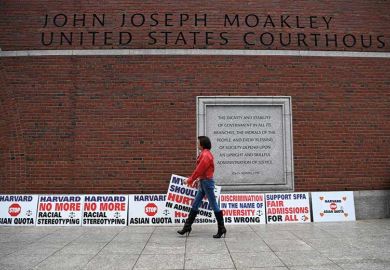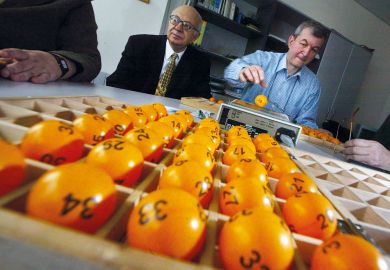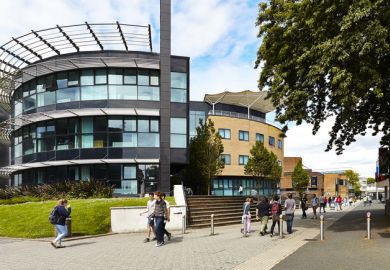Elite universities need to radically rethink their role as “sorting machines for the meritocratic order”, according to the political philosopher Michael Sandel.
In his new book, The Tyranny of Merit: What’s become of the common good?, Professor Sandel considers how the past four decades have witnessed not only “growing inequality” but “changing attitudes towards success”, he told Times Higher Education. The result is that “those who have landed on top have come to believe that their success is their own doing and they therefore deserve the benefits the market bestows on the successful – and that by implication those who have lost out must deserve their fate as well”. A world of “winners and losers” is also a world of “hubris and humiliation”.
Higher education, continued Professor Sandel, the Anne T. and Robert M. Bass professor of government at Harvard University, was deeply implicated in these developments because “elite universities have been cast in the role of arbiters of opportunity, so they stand at the apex of the system of meritocratic competition. They allocate the credentials that contribute to the attitudes I have described.”
Governing and policymaking elites are more diverse on many criteria than in the past, but they are far more dominated by the highly educated. At the very least, Professor Sandel explained, this unfairly excluded the insights of people without degrees who “have better practical judgement and sense of identity with their fellow citizens than many of the highly credentialed”. It was even possible that disciplinary trends such as “the growing emphasis on technocratic forms of social science, especially the value-neutral way economics is taught”, might be actively harmful, by “dulling the practical judgement and breadth of vision of those who have had that kind of education”.
There are also issues of attitude. Barack Obama, as The Tyranny of Merit points out, not only had a “fondness for the highly credentialed throughout his presidency” but also had a habit of falling back on the word “smart” (“smart regulations”, “smart growth”, “smart spending cuts” and so on) as the ultimate term of praise, and “smart policies” tended to require “smart people” – technocratic experts and elites – to carry them out.
Given this environment, Professor Sandel recognised something legitimate in “the resentment, widespread among many working people, of meritocratic elites...I do think that the mainstream parties and politicians who were surprised by the populist backlash did not see this coming in part because they were tone-deaf to the condescension of credentialed meritocratic elites towards those who don’t have a diploma from a four-year university.”
Observing that “admission to elite colleges and universities is the object of fevered striving”, Professor Sandel said that while this might seem to benefit such institutions, they and the wider society were paying a price for it.
He urged them, therefore, to do much more “to ensure that they are admitting talented first-generation students” – the proportion at Harvard today is no higher than it was in 1960 – and to “pay as much attention to that as to other aspects of diversity”. He was worried by how even “aspects of student life outside the classroom”, such as extracurricular clubs and societies, were now “excessively dominated by networking activities” and “highly pressurised rituals of selecting and rejecting”. Fraternities and sororities were a good example of what he was opposed to: “If I could wave a magic wand, I would make them disappear. I don’t think they exercise a healthy influence on university life.”
Yet by far his most radical proposal to address this situation is what Professor Sandel called “a lottery of the qualified”.
Harvard and Stanford University both receive about 40,000 applications for 2,000 places each year. Although Professor Sandel acknowledged that some of those candidates would need to be weeded out, he believed that “the majority could do the work and do it well”. Rather than devoting huge efforts to identifying the very best, a notoriously inexact science, top universities should simply draw lots to select entrants from among the pool of qualified candidates. Introducing an element of chance, as he puts it in his book, should help to “chasten merit’s hubris”.
It is a provocative idea, but how seriously did Professor Sandel want us to take it?
“I don’t mean it as a purely flippant suggestion,” he replied. “I think it should be taken seriously, but I don’t think it will be adopted any time soon…If people are more sceptical, I propose an interim solution: admit half the class in the usual way and half through a lottery – and see how they do. Stanford did seriously consider this in the late 1960s: the faculty committee endorsed the idea but the dean of admissions opposed it.”
We may have to wait a while for his “lottery of the qualified”. In the meantime, Professor Sandel would like to see an urgent “debate about how current university admissions policies reinforce broader social attitudes towards winning and losing”.
POSTSCRIPT:
Print headline: Draw lots for Ivy League entry, philosopher suggests
Register to continue
Why register?
- Registration is free and only takes a moment
- Once registered, you can read 3 articles a month
- Sign up for our newsletter
Subscribe
Or subscribe for unlimited access to:
- Unlimited access to news, views, insights & reviews
- Digital editions
- Digital access to THE’s university and college rankings analysis
Already registered or a current subscriber?








